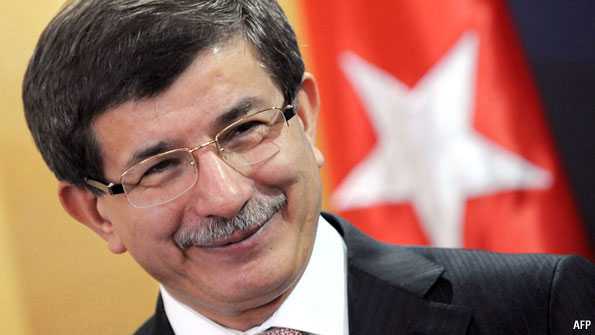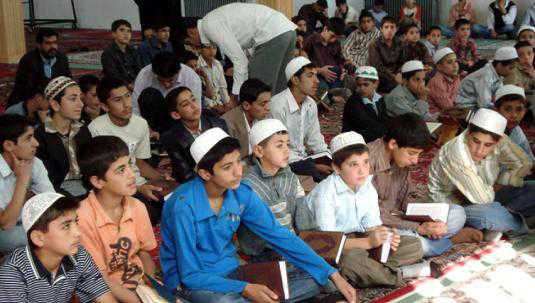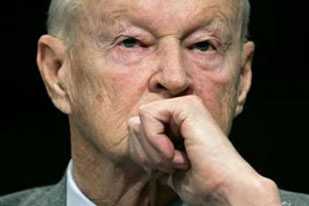
From Left: United States Air Force; Robert Young Pelton; Mike Wintroath/Associated Press; Adam Berry/Bloomberg News
From left: Michael D. Furlong, the official who was said to have hired private contractors to track militants in Afghanistan and Pakistan; Robert Young Pelton, a contractor; Duane Clarridge, a former C.I.A. official; and Eason Jordan, a former television news executive.
By DEXTER FILKINS and MARK MAZZETTI
Published: March 14, 2010
KABUL, Afghanistan — Under the cover of a benign government information-gathering program, a Defense Department official set up a network of private contractors in Afghanistan and Pakistan to help track and kill suspected militants, according to military officials and businessmen in Afghanistan and the United States. The official, Michael D. Furlong, hired contractors from private security companies that employed former C.I.A. and Special Forces operatives. The contractors, in turn, gathered intelligence on the whereabouts of suspected militants and the location of insurgent camps, and the information was then sent to military units and intelligence officials for possible lethal action in Afghanistan and Pakistan, the officials said.
While it has been widely reported that the C.I.A. and the military are attacking operatives of Al Qaeda and others through unmanned, remote-controlled drone strikes, some American officials say they became troubled that Mr. Furlong seemed to be running an off-the-books spy operation. The officials say they are not sure who condoned and supervised his work.
It is generally considered illegal for the military to hire contractors to act as covert spies. Officials said Mr. Furlong’s secret network might have been improperly financed by diverting money from a program designed to merely gather information about the region.
Moreover, in Pakistan, where Qaeda and Taliban leaders are believed to be hiding, the secret use of private contractors may be seen as an attempt to get around the Pakistani government’s prohibition of American military personnel’s operating in the country.
Officials say Mr. Furlong’s operation seems to have been shut down, and he is now is the subject of a criminal investigation by the Defense Department for a number of possible offenses, including contract fraud.
Even in a region of the world known for intrigue, Mr. Furlong’s story stands out. At times, his operation featured a mysterious American company run by retired Special Operations officers and an iconic C.I.A. figure who had a role in some of the agency’s most famous episodes, including the Iran-Contra affair.
The allegations that he ran this network come as the American intelligence community confronts other instances in which private contractors may have been improperly used on delicate and questionable operations, including secret raids in Iraq and an assassinations program that was halted before it got off the ground.
“While no legitimate intelligence operations got screwed up, it’s generally a bad idea to have freelancers running around a war zone pretending to be James Bond,” one American government official said. But it is still murky whether Mr. Furlong had approval from top commanders or whether he might have been running a rogue operation.
This account of his activities is based on interviews with American military and intelligence officials and businessmen in the region. They insisted on anonymity in discussing a delicate case that is under investigation.
Col. Kathleen Cook, a spokeswoman for United States Strategic Command, which oversees Mr. Furlong’s work, declined to make him available for an interview. Military officials said Mr. Furlong, a retired Air Force officer, is now a senior civilian employee in the military, a full-time Defense Department employee based at Lackland Air Force Base in San Antonio.
Network of Informants
Mr. Furlong has extensive experience in “psychological operations” — the military term for the use of information in warfare — and he plied his trade in a number of places, including Iraq and the Balkans. It is unclear exactly when Mr. Furlong’s operations began. But officials said they seemed to accelerate in the summer of 2009, and by the time they ended, he and his colleagues had established a network of informants in Afghanistan and Pakistan whose job it was to help locate people believed to be insurgents.
Government officials said they believed that Mr. Furlong might have channeled money away from a program intended to provide American commanders with information about Afghanistan’s social and tribal landscape, and toward secret efforts to hunt militants on both sides of the country’s porous border with Pakistan.
Some officials said it was unclear whether these operations actually resulted in the deaths of militants, though others involved in the operation said that they did.
Military officials said that Mr. Furlong would often boast about his network of informants in Afghanistan and Pakistan to senior military officers, and in one instance said a group of suspected militants carrying rockets by mule over the border had been singled out and killed as a result of his efforts.
In addition, at least one government contractor who worked with Mr. Furlong in Afghanistan last year maintains that he saw evidence that the information was used for attacking militants.
The contractor, Robert Young Pelton, an author who writes extensively about war zones, said that the government hired him to gather information about Afghanistan and that Mr. Furlong improperly used his work. “We were providing information so they could better understand the situation in Afghanistan, and it was being used to kill people,” Mr. Pelton said.
He said that he and Eason Jordan, a former television news executive, had been hired by the military to run a public Web site to help the government gain a better understanding of a region that bedeviled them. Recently, the top military intelligence official in Afghanistan publicly said that intelligence collection was skewed too heavily toward hunting terrorists, at the expense of gaining a deeper understanding of the country.
Instead, Mr. Pelton said, millions of dollars that were supposed to go to the Web site were redirected by Mr. Furlong toward intelligence gathering for the purpose of attacking militants.
In one example, Mr. Pelton said he had been told by Afghan colleagues that video images that he posted on the Web site had been used for an American strike in the South Waziristan region of Pakistan.
Among the contractors Mr. Furlong appears to have used to conduct intelligence gathering was International Media Ventures, a private “strategic communication” firm run by several former Special Operations officers. Another was American International Security Corporation, a Boston-based company run by Mike Taylor, a former Green Beret. In a phone interview, Mr. Taylor said that at one point he had employed Duane Clarridge, known as Dewey, a former top C.I.A. official who has been linked to a generation of C.I.A. adventures, including the Iran-Contra scandal.
In an interview, Mr. Clarridge denied that he had worked with Mr. Furlong in any operation in Afghanistan or Pakistan. “I don’t know anything about that,” he said.
Mr. Taylor, who is chief executive of A.I.S.C., said his company gathered information on both sides of the border to give military officials information about possible threats to American forces. He said his company was not specifically hired to provide information to kill insurgents.
Some American officials contend that Mr. Furlong’s efforts amounted to little. Nevertheless, they provoked the ire of the C.I.A.
Last fall, the spy agency’s station chief in Kabul, Afghanistan’s capital, wrote a memorandum to the Defense Department’s top intelligence official detailing what officials said were serious offenses by Mr. Furlong. The officials would not specify the offenses, but the officer’s cable helped set off the Pentagon investigation.
Afghan Intelligence
In mid-2008, the military put Mr. Furlong in charge of a program to use private companies to gather information about the political and tribal culture of Afghanistan. Some of the approximately $22 million in government money allotted to this effort went to International Media Ventures, with offices in St. Petersburg, Fla., San Antonio and elsewhere. On its Web site, the company describes itself as a public relations company, “an industry leader in creating potent messaging content and interactive communications.”
The Web site also shows that several of its senior executives are former members of the military’s Special Operations forces, including former commandos from Delta Force, which has been used extensively since the Sept. 11 attacks to track and kill suspected terrorists.
Until recently, one of the members of International Media’s board of directors was Gen. Dell L. Dailey, former head of Joint Special Operations Command, which oversees the military’s covert units.
In an e-mail message, General Dailey said that he had resigned his post on the company’s board, but he did not say when. He did not give details about the company’s work with the American military, and other company executives declined to comment.
In an interview, Rear Adm. Gregory Smith, the top military spokesman in Afghanistan, said that the United States military was currently employing nine International Media Ventures civilian employees on routine jobs in guard work and information processing and analysis. Whatever else other International Media employees might be doing in Afghanistan, he said, he did not know and had no responsibility for their actions.
By Mr. Pelton’s account, Mr. Furlong, in conversations with him and his colleagues, referred to his stable of contractors as “my Jason Bournes,” a reference to the fictional American assassin created by the novelist Robert Ludlum and played in movies by Matt Damon.
Military officials said that Mr. Furlong would occasionally brag to his superiors about having Mr. Clarridge’s services at his disposal. Last summer, Mr. Furlong told colleagues that he was working with Mr. Clarridge to secure the release of Pfc. Bowe Bergdahl, a kidnapped soldier who American officials believe is being held by militants in Pakistan.
From December 2008 to mid-June 2009, both Mr. Taylor and Mr. Clarridge were hired to assist The New York Times in the case of David Rohde, the Times reporter who was kidnapped by militants in Afghanistan and held for seven months in Pakistan’s tribal areas. The reporter ultimately escaped on his own.
The idea for the government information program was thought up sometime in 2008 by Mr. Jordan, a former CNN news chief, and his partner Mr. Pelton, whose books include “The World’s Most Dangerous Places” and “Licensed to Kill: Hired Guns in the War on Terror.”
Top General Approached
They approached Gen. David D. McKiernan, soon to become the top American commander in Afghanistan. Their proposal was to set up a reporting and research network in Afghanistan and Pakistan for the American military and private clients who were trying to understand a complex region that had become vital to Western interests. They already had a similar operation in Iraq — called “Iraq Slogger,” which employed local Iraqis to report and write news stories for their Web site. Mr. Jordan proposed setting up a similar Web site in Afghanistan and Pakistan — except that the operation would be largely financed by the American military. The name of the Web site was Afpax.
Mr. Jordan said that he had gone to the United States military because the business in Iraq was not profitable relying solely on private clients. He described his proposal as essentially a news gathering operation, involving only unclassified materials gathered openly by his employees. “It was all open-source,” he said.
When Mr. Jordan made the pitch to General McKiernan, Mr. Furlong was also present, according to Mr. Jordan. General McKiernan endorsed the proposal, and Mr. Furlong said that he could find financing for Afpax, both Mr. Jordan and Mr. Pelton said. “On that day, they told us to get to work,” Mr. Pelton said.
But Mr. Jordan said that the help from Mr. Furlong ended up being extremely limited. He said he was paid twice — once to help the company with start-up costs and another time for a report his group had written. Mr. Jordan declined to talk about exact figures, but said the amount of money was a “small fraction” of what he had proposed — and what it took to run his news gathering operation.
Whenever he asked for financing, Mr. Jordan said, Mr. Furlong told him that the money was being used for other things, and that the appetite for Mr. Jordan’s services was diminishing.
“He told us that there was less and less money for what we were doing, and less of an appreciation for what we were doing,” he said.
Admiral Smith, the military’s director for strategic communications in Afghanistan, said that when he arrived in Kabul a year later, in June 2009, he opposed financing Afpax. He said that he did not need what Mr. Pelton and Mr. Jordan were offering and that the service seemed uncomfortably close to crossing into intelligence gathering — which could have meant making targets of individuals.
“I took the air out of the balloon,” he said.
Admiral Smith said that the C.I.A. was against the proposal for the same reasons. Mr. Furlong persisted in pushing the project, he said.
“I finally had to tell him, ‘Read my lips,’ we’re not interested,’ ” Admiral Smith said.
What happened next is unclear.
Admiral Smith said that when he turned down the Afpax proposal, Mr. Furlong wanted to spend the leftover money elsewhere. That is when Mr. Furlong agreed to provide some of International Media Ventures’ employees to Admiral Smith’s strategic communications office.
But that still left roughly $15 million unaccounted for, he said.
“I have no idea where the rest of the money is going,” Admiral Smith said.
Dexter Filkins reported from Kabul, and Mark Mazzetti from Washington.






 Armenia — Defense Minister Seyran Ohanian addresses students and professors at Yerevan State University on January 25, 2010.
Armenia — Defense Minister Seyran Ohanian addresses students and professors at Yerevan State University on January 25, 2010.


